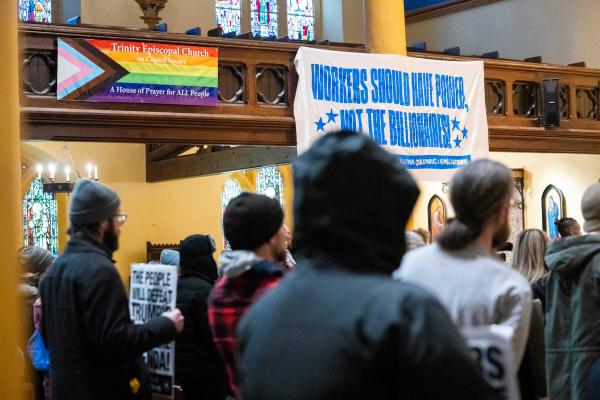The portmanteau began as a joke: “Barbenheimer,” the megaplex mega-weekend that saw the premier of two highly anticipated films that couldn’t have been more different. One was Greta Gerwig’s Barbie, a day-glo feminist celebration of the world’s most popular doll. The other was Christopher Nolan’s latest, a three-hour biopic about J. Robert Oppenheimer, the father of the atomic bomb. It was Gerwig vs. Nolan, Barbie vs. the bomb, the goddess of beauty vs. the god of war.
But then something beautiful happened: People decided to go see both. My partner and I were some of the more than 200,000 moviegoers who did a same-day double feature. Countless more broke the five hours of film up over multiple days, delivering an historic weekend box office. Barbie debuted at $155 million, the largest opening weekend ever for a female director, while Oppenheimer pulled in $80.5 million — an almost unbelievable sum for a bleak, 3-hour, R-rated biopic. Both films vastly overperformed industry expectations, morphing Barbenheimer from a joke into a celebration of the power of cinematic stories.
Both Barbie and Oppenheimer are terrific films in their own rights; each has already launched a thousand think-pieces. But the magic of Barbenheimer is that the whole is perhaps even greater than the sum of its parts. Because these two blockbuster films opened the same weekend, and because so many of us decided to watch them back-to-back, Barbie and Oppenheimer became unlikely dance partners, setting up strange and poignant cinematic juxtapositions. Consider these two scenes side-by-side:
In a scene that seems to draw directly from history, Oppenheimer (Cillian Murphy) sits in the Oval Office pleading with then-President Harry S. Truman (Gary Oldman). We’re in the wake of World War II and Oppenheimer begs Truman to help him unring the bell of the atom bomb that has begun the global nuclear arms race.
Meanwhile, Barbie (Margot Robbie) stands before the (all-male) Mattel board of directors, demanding to speak to the CEO, who Barbie assumes must be female. Barbie has escaped from Barbieland and is looking for the troubled girl who plays with her in the real world; Mattel’s CEO (Will Ferrell) fears her escape could cause reality itself to crumble.
Both movies urge us to consider what responsibility a creator has for their creations. In the Oval Office, Truman castigates Oppenheimer for his worry about his own legacy, insisting somewhat bitterly: “You didn’t drop the bomb — I did. Hiroshima isn’t about you.” Similarly, Mattel’s CEO tries to assure Barbie that, while she is the only female in the room, he himself has a daughter and is the mother of a son — and, as such, Barbie (and by extension, Mattel), is a force for female empowerment. Oppenheimer the movie ensures we will in fact remember Oppenheimer the man; Barbie the movie celebrates Barbie the toy.
Both films are sympathetic to creators, but neither film lets their creations off the hook. Oppenheimer worries aloud how the nuclear power he unleashed will shape the atomic age. Barbie faces a lunch table of schoolgirls who tell her exactly how the Barbie beauty standards made them feel un-feminine. But both films ultimately move beyond the myth of the single creator and focus on the forces that shape that creation’s ongoing impact on the larger world. Is Barbie a feminist icon, or does she set unrealistic beauty standards and hold feminism back? Does the government have a responsibility to maintain the biggest arsenal of nuclear weapons to ensure citizens’ safety or does it have a greater responsibility to ensure the safety of its citizens by other means?
I’ve asked similar questions about Jesus, too. Jesus created the church, a movement founded on the rock of Peter’s messianic confession. In the centuries since, the church has been a source of both liberation and oppression, including conquest, colonization, genocide, white supremacy, bigotry, and sexual abuse. Do we hold Jesus responsible for the myriad evils the church has worked in his name? And what responsibility do the rest of us, who belong to the church, have for actions done in Jesus’ name?
We Christians often want to protect Jesus from association with those who act badly in his name. Much like Gerwig and Nolan distance the creators in their films from the negative impact of their creations, Christians would like to rush to defend Jesus. “They’re not really Christians,” we insist. “The real Jesus isn’t like that.”
In Monsters, film critic Claire Dederer explores what we do with the art of monstrous men (Roman Polanski, Woody Allen, Michael Jackson, etc.), observing that our question points to something more vulnerable and harder to verbalize: “This question is the merest gnat, buzzing around the monolith that is the bigger question: ‘What do we do about the monstrous people we love?’” And as she points out, “That question comes with another question nestled inside it: How awful can we be, before people stop loving us?” Maybe we impose distance between the people who create and the legacy of their complicated creations because we want to create that same distance between ourselves and the wicked behaviors of those we deem monstrous — especially in the church.
But that distance is a false one. Where can we begin to draw such lines? If responsibility for the bomb is in the hands of the U.S. government, then it’s in all our hands (with “our” being those with the privilege to vote). If Mattel and creator Ruth Handler are responsible for the harm Barbies have done to girls, then surely all of us who have used our dollars to propel the company to its success shoulder some of that responsibility. And that recognition demands more from us than our typical approaches to injustice: It’s tempting to think that if we just boycott this movie or that director, we’ll solve #MeToo. Post a black square on our social media or have a woman preach on Mother’s Day and we’re not like those (false?) Christians, right? Dederer observes that such individualistic thinking is the product of late capitalist liberalism: “This is the liberal, enlightened ideal of individual solutions—people will make good choices because people are inherently good. Liberalism wants you to turn your gaze away from the system and focus instead on the importance of your choices.”
Barbie employs a mother-daughter team to illustrate the limitations of this way of thinking. Gloria (America Ferrera) grew up playing with Barbies, empowered by the doll’s promise that a woman could be anything. She delivers a monologue for the ages about how the modern world makes female success impossible. Her daughter, Sasha (Ariana Greenblatt), dresses in black and declares Barbie to have set feminism back by half a decade with her unrealistic beauty standards. They’re both right, but when it comes to solving the film’s central crisis, neither viewpoint is really relevant. Without treading too far into spoilers, what matters isn’t their own analysis, but that both women join forces to use collective action to dismantle patriarchy. That’s right: We save the world by organizing to fight disenfranchisement. Our individual opinions matter less than our collective resistance to unjust systems.
Perhaps this is why Jesus is more interested in life-shaking, wholesale repentance rather than one-off acts of individual niceness. Jesus didn’t invite Peter, Andrew, James, and John on a weekend retreat; rather he insisted his disciples abandon their professions and become itinerant and nomadic like him (Matthew 4:18-22). When the so-called rich young ruler claimed he had always kept Torah, Jesus insisted he needed to liquidate and donate all his assets and join Jesus in order to gain eternal life (Mark 10:17-27). He praised Zacchaeus as a true son of Abraham not when Zacchaeus threw a party in Jesus’ honor, but only after the man promised to pay reparations for a lifetime of defrauding his neighbors (Luke 19:8-9). Jesus had no praise for Nicodemus, who sought him out to learn more about him; instead Jesus insisted the wealthy, urban religious leader must be born again, giving up his life of privilege and position to start from scratch (John 3:1-15). Jesus’ invitations were always to whole-life change, not one-time behavioral modifications. It’s why Jesus associated himself publicly with those on the margins while reserving his most withering critiques for those at the center of religious power.
This Jesus frightens those of us who similarly find ourselves near the center of culture — those of us who have the luxury of time to wonder whether Oppenheimer and Handler are angels or devils. We want a faith where holiness resides solely in individual actions rather than collective accountability, but Jesus reminds us we’re one spiritual family, one movement.
So are we responsible for the wicked deeds done in Jesus’ name? If we did them, then certainly. But the vast majority of the wrongdoings — like our long history of upholding white supremacy, running Indigenous boarding schools, and enacting denominational policies that disenfranchise LGBTQ+ Christians — are the product of many decisions, beyond a single person’s power to remedy. But if we are part of these systems, then what are we doing to change the monstrous systems? Are we educating ourselves on how the systems are designed to oppress? Are we organizing to consider how we can disrupt those systems?
After all, unlike Oppenheimer or the makers of Barbie, Jesus takes full responsibility for the harm done in his name. Rather than standing back with a frown of frustration on his face, Jesus made his home among the very peoples oppressed in his name. And as liberation theology insists, we still find Jesus among those who are vulnerable and marginalized and Christians who wish to join Jesus in healing the wounds caused in his name must be there too. We should find ourselves on the frontlines of the fight for trans rights, for Black lives, for Indigenous dignity. Our faith should compel us to disrupt abusive capitalist systems and oppose policies that accelerate climate change. Our faith should radicalize us.
The Barbenheimer phenomenon is a chance for us as a culture to grapple with the complicated legacies of world-changing creations. How much more should followers of Jesus be unafraid to face the complex legacy of Jesus’ work in the world? Only then can we commit ourselves to the revolutionary systemic changes Jesus makes possible — changes that can only be described as “resurrection.”
Got something to say about what you're reading? We value your feedback!







